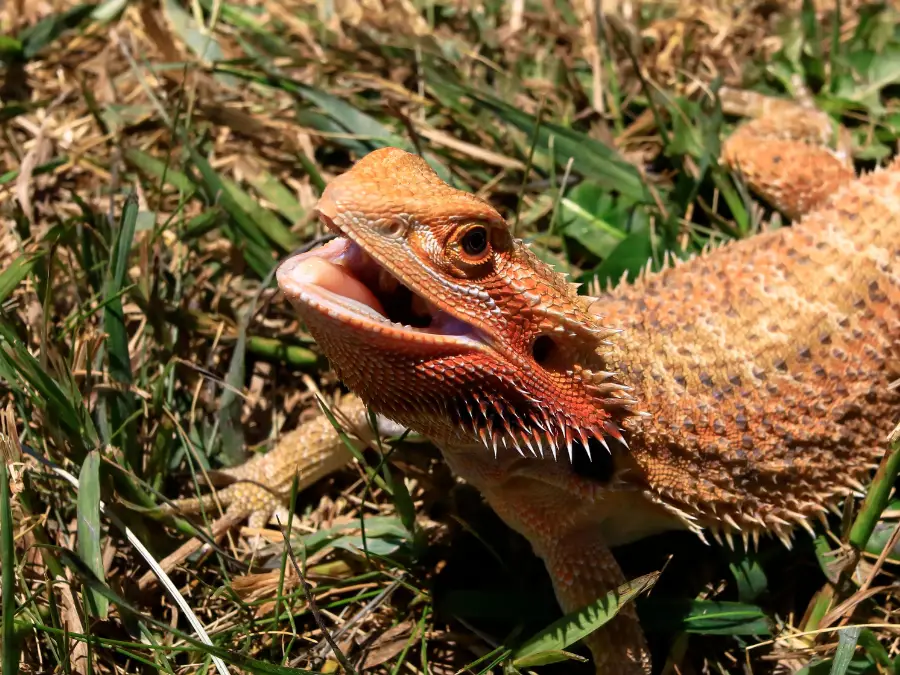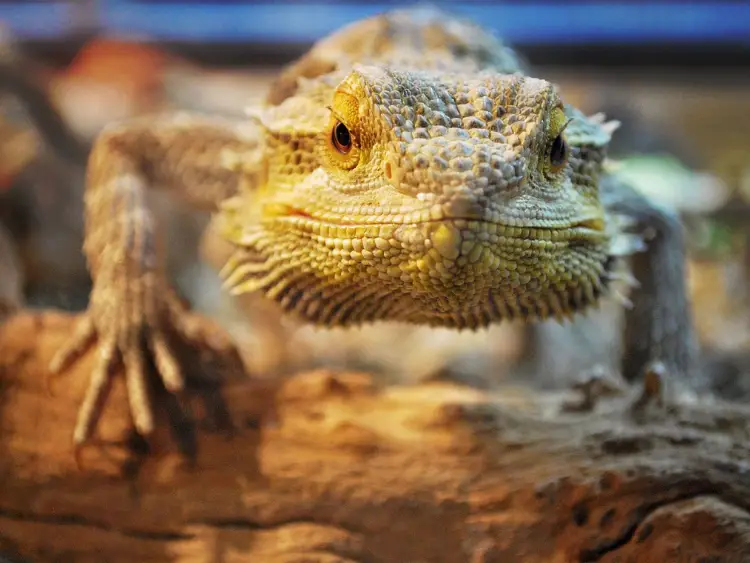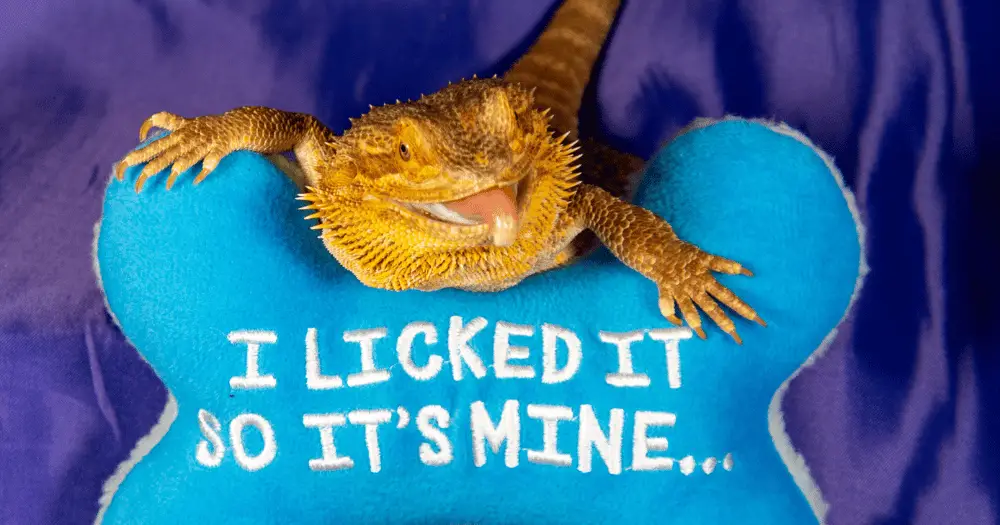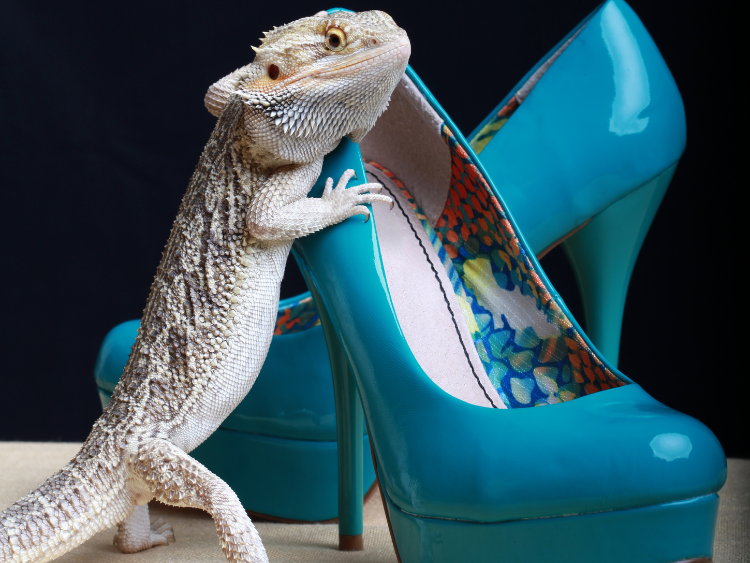If you are an owner of a reptile owner, you might wonder, “What does it mean when a bearded dragon licks you?” Is this normal behavior? Bearded dragons are fascinating and unique reptilian pets known for their curious nature and interesting behaviors.
Among these behaviors, licking is a common occurrence that can leave owners both delighted and intrigued.
Understanding the meaning behind the behavior of these curious creatures is key to building a deeper bond with your scaly companion. In this article, we will explore the various reasons why bearded dragons lick their owners, ranging from signs of affection to instinctual behaviors.
We’ll also delve into the role of body temperature regulation, the detection of microscopic particles, and their keen sense of taste. So, if you’re ready to unravel the mysteries of your bearded dragon’s licks, join us as we dive into the fascinating world of these social creatures and potential predators in search of a deeper understanding.
Why does my bearded dragon soak in its water bowl?
During the mating season or in the months following brumation, you may notice that your bearded dragon has a heightened interest in its water bowl. This behavior is a natural and instinctual response. Soaking in shallow water, such as a dragon-safe water bowl filled with fresh water, serves multiple purposes.
Firstly, it helps them rehydrate and maintain proper hydration levels. Secondly, it allows them to engage in sensory interpretation by absorbing the moisture through their skin, aiding in shedding.
Soaking is a normal behavior for bearded dragons and should be encouraged as part of their overall well-being. Just ensure the water is shallow, easily accessible, and changed regularly to provide a safe and clean environment for your dragon’s natural behavior.
What Does It Mean When a Bearded Dragon Licks You: Explained

Bearded dragons are fascinating reptiles that have become a popular choice for many pet owners. These curious creatures display a variety of behaviors, and one of the most intriguing is the act of licking.
Those new to owning a bearded dragon may wonder what it means when their reptile friend licks them, and the answer may surprise you.
Licking, in the context of bearded dragons, is a natural and instinctive action that helps them understand their environment and the creatures in it. When a bearded dragon licks you, it is not a sign of aggression or displeasure. In fact, it is just the opposite – it is a display of their curiosity and an attempt to gather information about you.
They use their tongue in combination with their Jacobson’s organ to detect different smells and tastes from the objects or beings they lick, providing them with valuable information about their surroundings and strengthening their bond with you as a trusted and familiar part of their world.
Understanding Bearded Dragon Behavior

Licking is a Natural Instinct
Bearded dragons use their tongues to gather sensory information about their surroundings. By licking objects, surfaces, and even their human companions, they collect scents to help them understand their environment.
Licking enables a bearded dragon to explore new things and become more comfortable with its habitat. This natural instinct helps the pet bearded dragon to stay curious, healthy, and connected to its environment.
Communication and Social Signals
Bearded dragons also use licking as a form of communication and social signals. When these reptiles show interest or non-threatening postures in a social setting, they often lick each other or human hands.
This behavior forms a unique bond with their human companions and helps build trust between them. Licking as a communication signal in bearded dragons isn’t limited to human interactions; they also use the same method among themselves, especially to find partners.
Stress and Aggression
While licking can be a sign of curiosity, affection, or interest, it may also sometimes indicate stress or aggressive behavior. A bearded dragon may lick its surroundings or human companions more than usual if it feels threatened or agitated.
This response helps the bearded dragon to assess its surroundings and identify potential dangers or dominant individuals in its environment.
When interpreting bearded dragon behavior, it is essential to consider multiple signs and factors. Aggression and stress can manifest in various ways apart from licking, and understanding these signs will help pet owners to maintain a healthy relationship with their reptiles.
Observing your bearded dragon closely and learning its specific ways of communicating can help ensure its well-being and develop a stronger bond between you and your bearded dragon.
Reasons Why a Bearded Dragon Licks You

Exploring Their Environment
Bearded dragons use their tongues to gather information about their environment. When your bearded dragon licks you, it may be trying to familiarize itself with your scent and texture. This helps them recognize you as part of their habitat.
Regular interaction with your bearded dragon will help it become more comfortable around you. As your reptile friend explores its surroundings, including its enclosure and your presence, it processes this information to understand its environment better.
Feeling Comfortable and Safe
When a bearded dragon licks its owner, it may indicate the lizard feels content or safe. This behavior often results from having established trust between the dragon and the owner. Licking can happen when you are holding your bearded dragon or simply touching it within the enclosure.
Make sure always to provide a secure environment and monitor their body language for any signs of distress or danger.
Showing Affection and Trust
Licking can also signify a bond of affection and trust between you and your bearded dragon. According to Reptile Informer, bearded dragons may display other forms of body language such as waving or basking to communicate with their owners.
So, a lick can be seen as a unique form of communication, reinforcing the bond between pet and owner.
Sensing Food and Water
Another reason bearded dragons might lick you is to check for food or water. Their sense of smell is crucial for detecting these essential resources, and their tongue naturally samples the area.
If your bearded dragon licks you, it might be thirsty, hungry, or merely investigating potential food sources. Make sure your pet’s enclosure has easy access to clean water and a proper diet to prevent hunger and thirst.
Mating Behavior
During the breeding season, male bearded dragons may display specific mating behaviors, including licking potential mates to detect pheromones. If you have a male bearded dragon, it might be mistaking you for another dragon due to it being the breeding season.
Be aware of your pet’s sex and its natural social hierarchy during this time. Additionally, make sure its habitat and care cater to its breeding needs and instincts.
5 More Signs Your Bearded Dragon Is Happy And Loves You! *WATCH THIS IF YOU OWN A BEARDIE*
Different Stages of Bearded Dragon’s Life
Baby and Juvenile Behavior
Bearded dragons are fascinating creatures, native to Australia, and have unique behaviors throughout their different life stages. During the baby and juvenile stage, bearded dragons engage in some interesting interactions, usually driven by curiosity and exploring their habitat.
Baby bearded dragons may lick their surroundings, including their owners, as a way to familiarize themselves with their environment.
Waving is another common behavior in this stage, which is a friendly gesture towards other lizards and may also be directed at their owners. Baby bearded dragons require proper care, including a balanced diet and a warm, secure habitat to thrive and grow into healthy adults.
Adult Behavior
As bearded dragons mature, their behavior will change as well. Adult bearded dragons may still lick you, but it could be for different reasons. One possibility is that they are exploring and tasting their environment, especially if you’ve recently handled their food.
Another reason could be territorial behavior, where the lizard, including you, claims its territory by licking surfaces.
During the breeding season, adult female bearded dragons might exhibit more assertive behavior while trying to establish dominance. Adult bearded dragons should be given enough space in their habitat to maintain a comfortable and stress-free environment.
Brumation and Seasonal Changes
Brumation is a natural process for bearded dragons, similar to hibernation, where the lizard’s metabolism slows down, and they become less active. This usually occurs during the colder months in the wild, but captivity may also trigger this process if the habitat temperature changes or there’s a lack of adequate food and water.
During this period, bearded dragons might not exhibit their usual interactive behavior, such as licking or waving.
To ensure the health and well-being of your bearded dragon during this stage, it’s crucial to consult a veterinarian familiar with reptiles for proper guidance on temperature, nutrition, and other factors that might impact their brumation period.
Caring for Your Bearded Dragon

Creating a Comfortable Habitat
To ensure a safe and comfortable environment for your bearded dragon, it’s important to provide them with a suitable enclosure. Choose a spacious and well-ventilated tank that allows them to move around freely. The temperature plays a vital role in maintaining their health and activities, so install a heat lamp and thermostat to regulate the temperature in their enclosure.
Ensure there is a gradient in temperature, with a warm basking area (95-105°F) and a cooler zone (around 80°F) for them to rest or hide. Provide safe hiding spots, climbing materials, and a non-toxic substrate that is easy to clean.
Providing Proper Nutrition
A proper diet for bearded dragons consists of a balanced mix of live insects and vegetables. Younger dragons require 80% insects and 20% vegetables, while adult dragons should eat 20% insects and 80% vegetables.
Variety is essential in their diet, so offer a wide range of safe insects and vegetables rich in nutrients and vitamins. Always pay attention to the size of the insects and avoid feeding them anything larger than the gap between their eyes.
Ensuring Good Health
Regular checkups with a reptile veterinarian are crucial to maintaining your bearded dragon’s good health. Be mindful of changes in their behavior, appetite, or physical appearance that may signal distress or illness.
Also, allow your bearded dragon to swim in shallow warm water for 10 to 30 minutes without soaps or detergents; it helps them clean themselves, stay hydrated, and aid in the shedding process. Always monitor your pet during baths; if they produce waste in the water, drain and rinse them immediately.
Handling and Bonding with Your Pet
Bearded dragons are usually gentle and calm, making them ideal companions for pet owners. When you handle your bearded dragon, approach them slowly and cautiously to minimize stress.
It’s essential to form a bond with your pet reptile by spending time with them, gently touching and stroking them, and allowing them to become familiar with your scent.
Remember that bearded dragons may lick to gather information about their surroundings through their vomeronasal organ (Jacobson’s organ), so don’t be alarmed if they lick you or their environment. This behavior is a normal part of their communication and helps them feel relaxed and secure in their surroundings.
